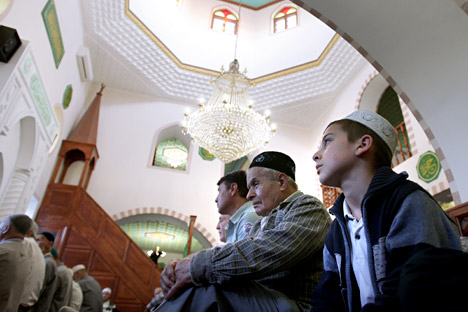
Muslims pray at the Kebir-Jami Mosque in Simferopol, Crimea, celebrating Eid al-Fitr that marks the end of the holy month of Ramadan.
Taras Litvinenko/RIA NovostiThe World Congress of Crimean Tatars was held on August 2 and 3 in Ankara. Crimean Tatar Diaspora from 12 countries attended the event. The Congress was organized by Mustafa Jemilev, a well-known dissident, now designated as the representative of the President of Ukraine on Affairs of the Crimean Tatar people, and Refat Chubarov, chairman of the Mejlis (the representative body of the Crimean Tatars).
Contradictory reaction
Congress members condemned the “annexation of the Crimea” in March 2014, accused the Russian authorities of disregarding fundamental freedoms of the people, and appealed to the United Nations to recognize Russia's actions against the Crimean Tatar people as genocide. Meanwhile, representatives of the Crimean Tatars loyal to Russia criticized the Congress. The social movement of the Crimean Tatars, “Crimea,” accused the organizers of the Congress of attempting to mislead representatives of the Crimean Tatar Diaspora.
Alexander Formanchuk, co-chairman of the Association of Political Scientists of Crimea, expressed doubt in an interview to RIR whether Crimean Tatars, who are actually from Crimea, were adequately represented at the Congress.
“As far as I know, only 17 people at the Congress were actually from Crimea, and most of these 17 were not from the Crimea itself, but from the bordering territories of Ukraine. The rest of the delegates were the representatives of the diaspora.”
Heavy burden of history
Crimean Tatars have a history of fairly complicated relations with Russia. These Tatars (who have no common origins with the Tatars of Tatarstan) came into being in the fifteenth century, with the creation of the Crimean Khanate. The Khanate lasted three centuries, after which, in 1783, it was annexed by the Russian Empire during the Russian-Turkish wars.
The most difficult period for relations between the Crimean Tatars and Russia was during the reign of Stalin. In 1944 an order was issued to deport the Crimean Tatars from the Crimea. The official reason given was that, during the German occupation (1941-1944), a part of the Crimean Tatars collaborated with the Germans. In just two days the Crimean Tatars were forcibly evicted to remote areas of the Soviet Union, mainly Uzbekistan. Until 1989, the Crimean Tatars were not allowed to return to their historical homeland.
“Deportation was the most terrible crime against the Crimean Tatar people, it caused death of up to 40% of the population,” Aider Mujdabaev, Crimean Tatar journalist and public figure, told RIR. “Naturally, it leaves its mark. But the attitude of Crimean Tatars towards the Russian people is absolutely normal. There is only negativity towards the Russian state.”
Situation today
Memories of their deportation and hostility towards Russian authorities prompted many Crimean Tatars to view the annexation of Crimea by Russia very negatively.
“The Crimean Tatars were against it, but their opinion was ignored. Even before the referendum (March 16, 2014, about the annexation to Russia - RIR) Crimean Tatars held mass protests, but the Russian media did not report it,” said Mujdabaev. Representatives of the Mejlis of the Crimean Tatars called for a boycott of the March 16 referendum, while Jemilev warned that Russia would face ethnic violence in case of the “annexation of Crimea.”
Despite the fact that many Crimean Tatars are still dissatisfied with the Russian government, Jemilev's prediction has not come true.
“Despite the scepticism towards the Russian authorities, most people still live a normal life. The vast majority of Crimean Tatars received Russian passports, receive pensions and social benefits. In 1.5 years under Russian rule there have been no ethnic clashes nor large protests against the government,” said Formanchuk.
The split
The Crimean Tatar elite who support Jemilev and Chubarov stand for Crimea as part of Ukraine. But there are those who support the new government.
“The Tatars are motivated to participate in building the new Crimea, and no one can advise the authorities how to solve their problems better than them,” ‘Kommersant’ quotes Zaur Smirnov, a representative of the Mejlis loyal to Russian authorities, as saying. Smirnov is now the chairman of the State Committee of the Republic of Crimea).
Mujdabaev is critical of the pro-Moscow Crimean Tatars: “These people have compromised with the Russian authorities in order to keep their business, their status in society. They cannot be called real Crimean Tatar elite, people do not respect them”. Formanchuk does not share this opinion, and believes disagreement is normal. “The Crimean Tatars, including the national elite, are now split. Part of them is pro-Russian, another part is in opposition. It is normal,” -Formanchuk said.
All rights reserved by Rossiyskaya Gazeta.
Subscribe
to our newsletter!
Get the week's best stories straight to your inbox